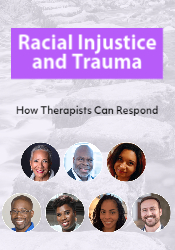How Can White Therapists Be Better Allies?
Deepening the Conversation around Race-Based Trauma
Gail Parker, Monnica Williams, and S. Kent Butler

The death of George Floyd at the hands of police and the protests and events that followed have left many therapists asking important questions: What can I do to help heal enduring racial stress and trauma? How can I address the grief, anger, and pain of racial injustice? As a mental health professional, what can I do to be an anti-racist?
The first of two panel discussions around these issues features S. Kent Butler, president-elect of the American Counseling Association; Monnica Williams, associate professor at University of Ottawa and coauthor of Eliminating Race-Based Mental Health Disparities; Gail Parker, president of the Black Yoga Teachers Alliance and author of Restorative Yoga for Ethnic and Race-Based Stress and Trauma, and Zach Taylor, director CE for PESI and Psychotherapy Networker.
In this clip, they discuss the steps white therapists can take to open up healing discussions around race in therapy and address racial injustice in our society. "There's a misperception that this is a Black-person problem," Williams says, "but it's an everyone problem."
As Butler says, it seems more white therapists are now taking note of what’s been happening in the Black community for a long time. When working with Black clients, he says, it's important "to just recognize that our stories are true, to sit in that truth with us, and then to go inward and explore how your privilege might have allowed you to put this on the backburner for so long.”
Engaging in tough self-explorations around race and actively calling out racism isn't simply a choice, these therapists stress. It's an essential component, an ethical mandate, in practicing a healing craft.
As Parker explains, "Calling out racism isn’t easy. It's not always safe," she says. "So if you're waiting for it to be easy, or waiting for it to feel safe, it's not going to happen. This requires courage, a willingness to act in the face of your own fear."
***
Stay tuned for more clips from our panel discussion on race.
The first of two panel discussions around these issues features S. Kent Butler, president-elect of the American Counseling Association; Monnica Williams, associate professor at University of Ottawa and coauthor of Eliminating Race-Based Mental Health Disparities; Gail Parker, president of the Black Yoga Teachers Alliance and author of Restorative Yoga for Ethnic and Race-Based Stress and Trauma, and Zach Taylor, director CE for PESI and Psychotherapy Networker.
In this clip, they discuss the steps white therapists can take to open up healing discussions around race in therapy and address racial injustice in our society. "There's a misperception that this is a Black-person problem," Williams says, "but it's an everyone problem."
As Butler says, it seems more white therapists are now taking note of what’s been happening in the Black community for a long time. When working with Black clients, he says, it's important "to just recognize that our stories are true, to sit in that truth with us, and then to go inward and explore how your privilege might have allowed you to put this on the backburner for so long.”
Engaging in tough self-explorations around race and actively calling out racism isn't simply a choice, these therapists stress. It's an essential component, an ethical mandate, in practicing a healing craft.
As Parker explains, "Calling out racism isn’t easy. It's not always safe," she says. "So if you're waiting for it to be easy, or waiting for it to feel safe, it's not going to happen. This requires courage, a willingness to act in the face of your own fear."
***
Stay tuned for more clips from our panel discussion on race.
Want to deepening the conversation around race-based trauma?

TWO FREE PANEL DISCUSSIONS
Racial Injustice and Trauma: How Therapists Can Respond
Please join us for free access to two, one-hour panel discussions around the issue of racial injustice and trauma. These important conversations, featuring the perspectives and guidance of several clinicians and thought leaders, will highlight how we can bring issues of race into therapy, and how we can address racial disparities in our field and professional communities.
Racial Injustice and Trauma: How Therapists Can Respond
Please join us for free access to two, one-hour panel discussions around the issue of racial injustice and trauma. These important conversations, featuring the perspectives and guidance of several clinicians and thought leaders, will highlight how we can bring issues of race into therapy, and how we can address racial disparities in our field and professional communities.
Topic: Cultural, Social, & Racial Issues
Tags: Advice | Community | Cultural Diffferences | Culture | Race in therapy | Trauma





